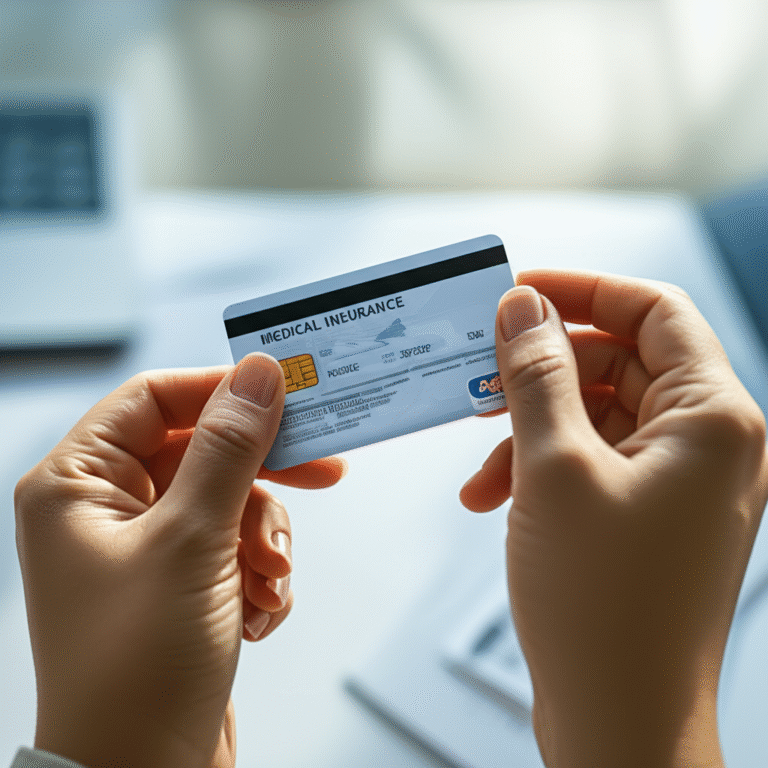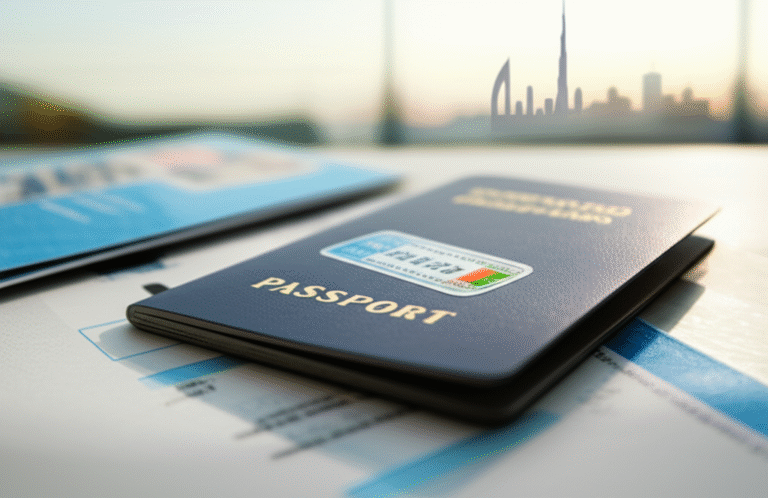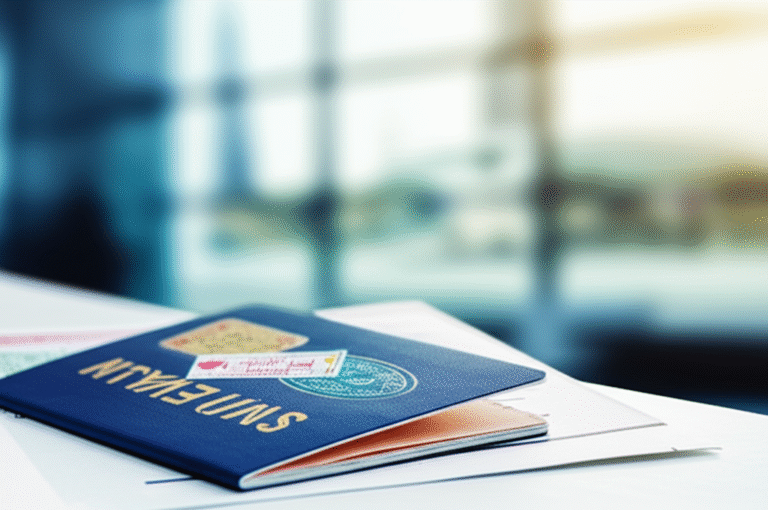How to Collect Dubai Visa
Collecting your Dubai visa is simpler than you might think! This guide provides a clear, step-by-step process for obtaining your Dubai visa, ensuring a smooth experience for travelers and residents.
Key Takeaways
- Understand visa types and eligibility.
- Gather all required documents accurately.
- Apply through authorized channels or government portals.
- Track your application status online.
- Collect your visa promptly upon approval.
- Know where to seek official assistance.
Planning a trip to Dubai, or perhaps moving there? One of the first things you’ll consider is your visa. For many, the process of obtaining a visa can seem a bit daunting. You might wonder about the right type of visa, the necessary paperwork, or where to even start. It’s a common question for travelers, expatriates, and business professionals alike. But don’t worry! This guide is designed to break down “how to collect Dubai visa” into simple, manageable steps. We’ll walk you through everything you need to know, making the visa collection process clear and straightforward from start to finish. Let’s begin your journey to the Emirate with confidence.
Understanding Dubai Visa Requirements
Before you can even think about collecting your Dubai visa, understanding the different types of visas and their specific requirements is crucial. Dubai, a global hub for tourism and business, offers various visa options tailored to different needs. Each type has its own set of criteria, application procedures, and validity periods. Getting this part right is the foundation for a successful visa collection process.
Common Dubai Visa Types
The type of visa you need depends entirely on the purpose and duration of your stay in Dubai. Here are some of the most common categories:
- Tourist Visa: For individuals visiting Dubai for leisure, sightseeing, or visiting friends and family. These are typically valid for 30 or 90 days and can be single or multiple entry.
- Transit Visa: For travelers passing through Dubai on their way to another destination. These are usually short-term, often valid for 48 or 96 hours.
- Service Visa: For individuals coming to Dubai to provide specific services, without the intention of taking up employment.
- Student Visa: For those wishing to pursue educational programs in Dubai. These require sponsorship from a recognized educational institution.
- Work Visa (Employment Visa): For expatriates who have secured a job offer from a Dubai-based employer. The employer usually sponsors this visa.
- Investor/Partner Visa: For individuals investing in businesses in Dubai or partnering with local companies.
- Golden Visa: A long-term residency visa offering extended stay for specific categories like investors, entrepreneurs, scientists, and outstanding students.
Eligibility Criteria
Eligibility for each visa type varies. Generally, you will need to demonstrate:
- A valid passport with sufficient remaining validity (usually at least six months).
- Proof of sufficient funds to support your stay.
- A clear criminal record (sometimes a Police Clearance Certificate is required).
- Good health (medical tests are often part of the process).
- The specific requirements related to the purpose of your visit (e.g., job offer for work visa, admission letter for student visa).
It is always best to check the official website of the General Directorate of Residency and Foreigners Affairs (GDRFA) or the UAE Federal Authority for Identity, Citizenship, Customs & Port Security (ICP) for the most up-to-date and specific eligibility criteria for your chosen visa category.
Gathering Your Dubai Visa Documents
The document submission phase is critical. Having all your documents in order beforehand will significantly speed up the application process and minimize the chances of rejection. Think of it as preparing your essential toolkit – each item plays a vital role.
Essential Documents for Most Visa Applications
While specific requirements can differ, a core set of documents is commonly needed. It’s wise to have these ready:
- Passport: Your original passport with at least six months of validity remaining. Copies of the passport’s first and last pages are also usually required.
- Passport-Sized Photographs: Recent, clear, color photographs meeting UAE visa specifications (usually white background, specific dimensions like 4×6 cm).
- Visa Application Form: Duly completed and signed. This can often be downloaded from the official portal or obtained from your sponsor.
- Proof of Travel Itinerary: Confirmed flight bookings (entry and exit) and hotel reservations, especially for tourist visas.
- Sponsorship Documents: Depending on the visa type, this could be a sponsorship letter from a company, a hotel, or a family member who is a UAE resident.
- Entry Permit/Visa Copy: If you are already in the UAE and changing your visa status.
- Emirates ID Copy: If you are a resident applying for a new visa or extension.
Specific Documents for Different Visa Types
Here’s a look at some additional documents that might be required for particular visas:
| Visa Type | Additional Documents Typically Required |
|---|---|
| Work Visa | Employment contract, offer letter from the employer, attested educational certificates, medical fitness certificate. |
| Student Visa | Admission letter from the educational institution, attested educational certificates, sponsor’s details. |
| Investor/Partner Visa | Trade license of the company, proof of investment, company registration documents, attested academic/professional certificates. |
| Medical Treatment Visa | Referral letter from a GCC-licensed hospital, proof of financial solvency. |
It’s always best to consult the official GDRFA website or the ICP website for the most accurate and exhaustive list of required documents for your specific situation. Missing even one document can cause delays or lead to your application being rejected.
Choosing Your Application Channel
Dubai offers several convenient and secure channels for applying for and collecting your visa. The right channel for you will depend on your location, nationality, and the type of visa you are applying for. Understanding these options ensures you apply through the most efficient and authorized route.
Official Government Portals
The most direct and recommended way to apply for many Dubai visas is through the official government websites. These platforms are designed for transparency and efficiency.
- General Directorate of Residency and Foreigners Affairs (GDRFA): For residents and specific visa types, the GDRFA offers online services for application and renewal.
- Federal Authority for Identity, Citizenship, Customs & Port Security (ICP): The ICP portal (formerly ICA) handles a wide range of visa applications and inquiries for various nationalities. It’s a central hub for many residency and visa-related services.
Using these official portals ensures that you are dealing directly with the issuing authority, minimizing the risk of fraud and ensuring your application is processed according to official procedures.
Authorized Travel Agencies and Visa Service Providers
For tourists or individuals who prefer assistance, numerous authorized travel agencies and visa processing centers in Dubai and abroad can help. These entities are officially licensed to assist with visa applications.
- Benefits: They can guide you through the process, help with document preparation, submit applications on your behalf, and often provide faster processing times for certain visa types.
- Caution: Always ensure you are dealing with a reputable and authorized agency. Check for their accreditation and reviews. Unverified agents can be a source of scams.
For any visa application, especially for employment or long-term residency, the employer or sponsoring entity often plays a key role in initiating and managing the visa process through authorized channels.
Embassies and Consulates Abroad
For individuals applying from outside the UAE, the UAE Embassy or Consulate in your home country is another official point of contact. They can provide information, accept applications, and guide you through the necessary steps.
The Dubai Visa Application and Collection Process
Once you’ve identified the correct visa type and gathered your documents, the next step is to navigate the application and collection process. This involves submitting your application, waiting for approval, and finally, collecting your visa. Dubai’s smart government initiatives have made much of this process digital and convenient.
Step 1: Online Application and Submission
Most visa applications in Dubai start online. You will typically need to:
- Visit the Official Portal: Go to the website of GDRFA or ICP, or an authorized airline if applying through them (common for tourist visas).
- Create an Account: You may need to register an account to access the services.
- Fill in the Application Form: Accurately complete all required fields. Double-check names, passport numbers, and dates.
- Upload Documents: Scan and upload all your supporting documents as per the specified format and size.
- Pay Fees: Settle the applicable visa application fees online using a credit or debit card. Fees vary based on visa type and duration.
Step 2: Application Processing and Approval
After submission, your application will be processed by the relevant authorities. This involves verification of your documents and background checks.
- Processing Time: Standard processing times can range from a few days to a couple of weeks. Some visa types or expedited services may be faster.
- Status Tracking: Most portals allow you to track your application status online using your application reference number. Keep this number safe.
You might be contacted by the immigration authorities if further information or clarification is needed. Responding promptly to such requests is essential.
Step 3: Visa Approval Notification
Once your visa is approved, you will usually receive an email notification. This notification often contains an entry permit or an approval letter, which is what you’ll need for entry into the UAE.
Step 4: Collecting Your Visa
The method of “collecting” your visa depends on the type of visa and how you applied:
- For Entry Clearance (Tourists, Short-term visits): If you applied through an airline or a travel agent, the visa is often electronically linked to your passport and uploaded into the airline’s system. You will receive an electronic visa (e-Visa) via email. This is what you present at immigration.
- For Residents and Long-Term Visas: Once your visa is approved and you are in the UAE, you will often proceed to have your visa stamped directly into your passport. This usually happens after a medical examination and Emirates ID application. The GDRFA or ICP service centers are where this typically takes place.
- Visa Stamping: For long-term visas (work, residency), after entering the UAE on your initial entry permit and completing necessary steps like medical tests and Emirates ID application, you’ll visit a GDRFA or ICP center to have the visa officially stamped into your passport. This final stamp signifies your legal residency status.
For e-Visas, there isn’t a physical collection. You simply need to print a copy of the e-Visa confirmation for your records and to present if required.
Visa on Arrival for Certain Nationalities
Dubai is known for its open-door policy, welcoming visitors from around the globe. For citizens of many countries, obtaining a visa in advance is not necessary. They can simply arrive at Dubai International Airport and receive a visa on arrival.
Who Qualifies for Visa on Arrival?
Citizens of the following regions and countries are eligible for visa-free entry, commonly granted as a 30-day or 90-day tourist visa upon arrival:
- European Union Member States
- United States of America
- United Kingdom
- Canada
- Australia
- Japan
- Singapore
- South Korea
- And many others.
The UAE government regularly updates its list of visa-exempt nationalities. It is always recommended to check the GDRFA website or the ICP website for the most current information regarding visa requirements for your specific nationality.
How Visa on Arrival Works
When you arrive at Dubai immigration:
- Proceed to the immigration counter.
- Present your valid passport (with at least six months of validity).
- The immigration officer will verify your details and stamp your passport with the appropriate visa (e.g., 30-day or 90-day entry permit).
- You may be asked about the purpose of your visit and your accommodation details.
This is the simplest method for eligible travelers to enter Dubai without prior visa application. However, ensure you meet the general entry requirements, such as having sufficient funds and a return ticket.
Pro Tips for a Smooth Visa Collection
Navigating the Dubai visa process can be made even smoother with a few insider tips. These practical pieces of advice can help you avoid common pitfalls and ensure your visa collection is efficient and stress-free.
Pro Tip: Always keep digital and physical copies of all your important documents, including your passport, visa, and flight bookings. This is invaluable in case of loss or if you need to present them at short notice.
Visa Extensions and Renewals
Sometimes, your initial visa might not be long enough, or you might wish to extend your stay. Dubai offers straightforward procedures for visa extensions and renewals, allowing you to continue your stay legally without necessarily departing the country.
Options for Extending Your Stay
There are generally two main ways to extend your stay:
- Visa Renewal (Without Leaving the Country): For certain visa types, you can renew your stay by paying the required fees and obtaining a new entry permit or visa stamp without having to exit the UAE. This is often the most convenient option.
- Visa Change Packages (Exit and Re-Entry): If you are on a tourist visa or a visa that cannot be renewed within the country, you may need to exit the UAE and re-enter on a new visa. This can be done via a short trip to a neighboring country (like Oman) or by flying out and returning. Some travel agencies offer specific “visa change” packages that handle the logistics.
Applying for Extensions or Renewals
The process for extensions and renewals is typically managed through the same official channels as initial applications:
- Online Application: Visit the GDRFA or ICP website.
- Eligibility Check: Verify if your current visa type is eligible for in-country renewal.
- Document Submission: Upload required documents, which may include your passport, current visa copy, medical certificate, and application form.
- Payment: Pay the renewal fees online.
- Approval: Once approved, your new visa or entry permit will be processed.
It’s crucial to initiate the renewal process well before your current visa expires to avoid overstay fines and legal consequences. Staying updated on the latest regulations through official government sources is always recommended.
Common Issues and How to Resolve Them
While the Dubai visa system is efficient, minor issues can sometimes arise. Knowing how to address them can save you time and frustration.
Visa Rejection
If your visa application is rejected, you will usually be notified with a reason. Common reasons include incomplete documentation, insufficient funds, or a negative security check.
- Action: Carefully review the reason for rejection. If it’s due to missing documents or incorrect information, you can reapply after rectifying the issue. If the reason is more complex, you may need to consult with a registered legal advisor or a reliable visa service provider.
Delays in Processing
Sometimes, visa processing can take longer than expected due to high application volumes or the need for further verification.
- Action: Use the online tracking system to check your application status. If there are significant delays beyond the usual timeframe, contact the official helpline of GDRFA or ICP, or your sponsoring agent.
Incorrect Information on Visa
It’s vital to check all details on your visa once you receive it (e.g., name spelling, passport number, date of birth).
- Action: If you find any errors, report them immediately to the issuing authority (GDRFA/ICP or your agent). Mistakes need to be corrected promptly, usually before you travel, to avoid issues at immigration.
Frequently Asked Questions (FAQ)
Q1: How long does it take to get a Dubai visa?
A1: Processing times vary. Tourist visas can take 1-5 working days. Employment or residency visas, which involve more steps, can take anywhere from a few days to a couple of weeks, depending on the sponsorship and required clearances.
Q2: Can I collect my Dubai visa in person?
A2: For e-Visas (common for tourists), you receive it electronically and don’t need to collect it physically. For long-term residency visas, after arriving with an entry permit, the visa is stamped into your passport at a GDRFA or ICP service center following medical tests and Emirates ID application.
Q3: What happens if my Dubai visa expires while I’m in the UAE?
A3: You must renew your visa before it expires. Overstaying can result in fines and potential bans from re-entering the UAE. The GDRFA and ICP websites provide information on renewal procedures.
Q4: Do I need a sponsor to get a Dubai visa?
A4: For work visas and some residency visas, a UAE-based employer or company acts as your sponsor. For tourist visas, airlines, hotels, or a resident family member can sometimes act as a sponsor. Some visa types, like student visas, require sponsorship from an educational institution.
Q5: How can I check my Dubai visa status?
A5: You can check your Dubai visa application status online through the official portals of the GDRFA or ICP, using your application reference number or other personal details.
Q6: What is the difference between an entry permit and a visa?
A6: An entry permit is often the initial document that allows you to enter the UAE. Once you are in the country and complete necessary procedures like medical tests and Emirates ID application, this permit is converted into a full visa stamped on your passport, granting residency.
Conclusion
Collecting your Dubai visa is a structured process designed for clarity and efficiency. By understanding the different visa types, meticulously preparing your documents, and utilizing the official application channels, you can navigate the journey from application to approval with confidence. Whether you are arriving for a short visit or planning a long-term stay, Dubai’s smart government services aim to make your entry as seamless as possible. Remember to always refer to the official government websites – the GDRFA and ICP – for the most accurate and up-to-date information. We hope this guide empowers you to collect your Dubai visa without any hitches, allowing you to fully enjoy all that this magnificent city has to offer!




